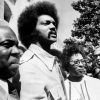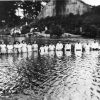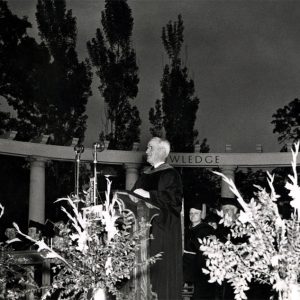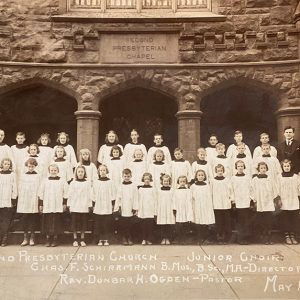calsfoundation@cals.org
Dunbar H. Ogden Jr. (1902–1978)
Dunbar Hunt Ogden Jr. was a Presbyterian minister who played an important role in the effort to desegregate Central High School in Little Rock (Pulaski County) in the mid-twentieth century. His support for the Little Rock Nine was controversial, and his efforts split his congregation. Ultimately, faced with diminishing support, Ogden resigned his pastorate and left Arkansas, taking over a church in West Virginia and eventually retiring in California.
Dunbar Ogden Jr. was born on August 15, 1902, in Columbus, Mississippi. One of seven children born to Dunbar H. Ogden, who was a minister, and Grace Augusta Cox Ogden, Ogden was brought up in Knoxville, Tennessee, and Atlanta, Georgia. He attended Boys High School in Atlanta before going to Davidson College in North Carolina. Ogden graduated from Davidson in 1923, and planning to follow his father into the ministry, he earned bachelor’s and master’s degrees from Union Theological Seminary in Richmond, Virginia.
He took his first pastorate in the mountain hollows of western North Carolina. In 1930, he moved to a church in Pikeville, Kentucky. There, he met Dorothy Coblentz, whom he married in 1933. The couple had four sons. Soon after their marriage, the Ogdens moved to Portsmouth, Ohio, where Dunbar led Second Presbyterian Church. He remained there until 1940, when he assumed the pastorate at the First Presbyterian Church of Staunton, Virginia. The Staunton posting represented a major step up in his career.
Ogden remained at the Staunton First Presbyterian Church until 1951, when he was struck by a debilitating attack of depression. With previous generations of his family also having suffered from depression, it had long been a part of his life, but this time he spent seven months undergoing a range of treatments, including electroshock therapy, at Johns Hopkins Hospital in Baltimore, Maryland. The episode split the family, with Dorothy taking their youngest son with her back to her mother’s home in Ohio while the three older boys remained in college and school in North Carolina, Virginia, and Missouri. Even after his release from Johns Hopkins, Ogden spent a year living in Arkansas with his brother Fred, a doctor, in Fayetteville (Washington County). Finally able to return to the ministry, he took a small rural pastorate in Pea Ridge (Benton County), where the family was reunited. In 1954, Ogden and the family moved to Little Rock, where he became the pastor of the city’s Central Presbyterian Church.
On the night of September 3, 1957, Daisy Bates, head of the Arkansas National Association for the Advancement of Colored People (NAACP), called Ogden. Because Ogden was serving as president of the Greater Little Rock Interracial Ministerial Alliance, Bates, who was overseeing the effort of desegregating Central High, asked him to gather a group of white minsters who could accompany the Little Rock Nine as they sought to enter the school. Ogden agreed to try, but after calling about a dozen of those he thought most likely to join, only one, Colbert Cartwright of the Pulaski Heights Christian Church, agreed to go. On the morning of September 4, accompanied by his own son David, Ogden went to the Bates home, where most of the Little Rock Nine students met before heading to Central High for what was intended to be their first day of school. (The students were turned away by the National Guard that day and did not begin school until September 25, 1957, under federal troop escort.) However, as he later recalled, at the time of his arrival at the Bates home, he was not yet certain that he would actually accompany the students.
That morning, Ogden led seven black students up to the National Guard lines at Central High, stepping into the history books and into the middle of a controversy that would impact the rest of his life. While local opposition headed by Governor Orval Faubus led President Dwight Eisenhower to send in federal troops, for those like Ogden who were in the middle of the effort, it led to hate mail, threats, and a wholly changed social dynamic. To address these concerns, as the school year progressed, Ogden and Daisy Bates ran a meeting that came to be known as the Thursday Group. An interracial gathering, it was a forerunner of modern support groups and was intended to help the families and others whose lives were turned upside down by the crisis.
At the same time, Ogden was also using his pulpit to address the issues that were central to the Little Rock Crisis. In April 1958, he traveled to Oakland, California, where, speaking at a number of different churches and organizations—Rotary, Kiwanis, etc.—he talked about “Christian Racial Relations” in hopes of enhancing people’s understanding of the issue. Later that spring, he delivered the keynote address at a conference in Tennessee sponsored by the National Council of Churches and other organizations to discuss the future of school integration. On May 27, 1958, Dunbar Ogden escorted Dr. Martin Luther King Jr. to the graduation ceremony of Little Rock Nine member Ernest Green at Central High.
Ogden’s commitment to the cause of integration was not well received by his church’s congregation. In the beginning, the members had supported—or at least tolerated—his involvement, but as attendance and contributions dropped, some of the church leaders began to exert pressure on him to resign for the good of the church. In late September, he offered his resignation. After preaching his last sermon at the end of October, Ogden moved his family to a small pastorate in Huntington, West Virginia. In April 1961, he moved to Bream Memorial Presbyterian Church in Charleston, West Virginia, where he served as associate pastor into the early 1970s, when he and Dorothy retired to California. Ogden died on January 29, 1978, in Oakland, California.
For additional information:
Marsh, Don. “Rev. Ogden’s Cruel Dilemma at Little Rock.” Sunday Gazette Mail (Charleston, West Virginia), December 16, 1962. Online at https://newspaperarchive.com/charleston-gazette-mail-dec-16-1962-p-17/ (accessed April 9, 2018).
Ogden, Dunbar H. My Father Said Yes: A White Pastor in Little Rock School Integration. Nashville, TN: Vanderbilt University Press, 2008.
William H. Pruden III
Ravenscroft School
 Civil Rights Movement (Twentieth Century)
Civil Rights Movement (Twentieth Century) Religion
Religion World War II through the Faubus Era, 1941 through 1967
World War II through the Faubus Era, 1941 through 1967 Dunbar H. Ogden
Dunbar H. Ogden  Rev. Ogden and Choir
Rev. Ogden and Choir 



Comments
No comments on this entry yet.